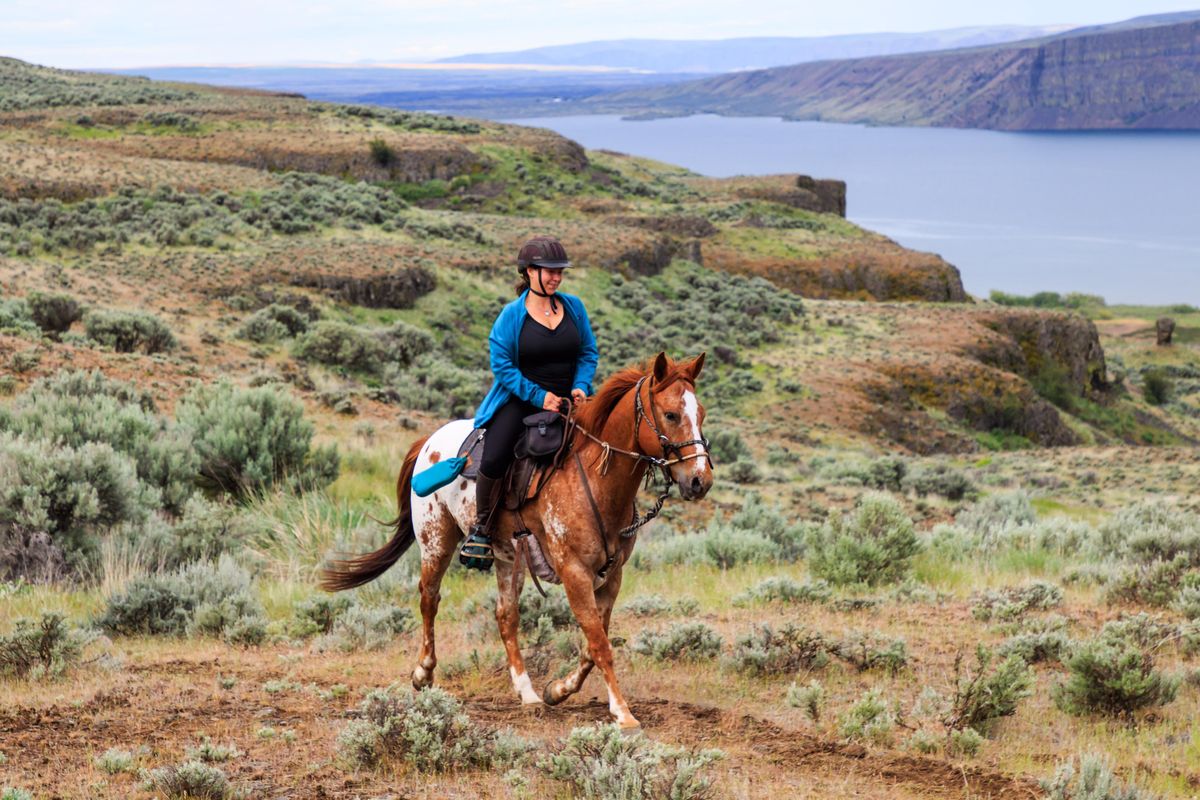Injured horse rescued by helicopter near Seattle, euthanized in Pullman

Just a mile from the trailhead, a saddle slipped and everything fell apart.
Jennifer Bloor was horsepacking Saturday with a friend just east of Snoqualmie Pass near Easton, Washington, riding her 7-year-old soro Appaloosa horse named Huckleberry.
Around 5 p.m., they headed back to the trailhead after spending the previous night camped under the stars near Kachess Lake.
Things were going smoothly until the saddle of Bloor’s riding partner slipped. The women dismounted on a narrow section of trail above Silver Creek – one side hugging a steep slope and the other side dropping into a deep ravine.
Bloor isn’t sure what happened next, but something spooked her friend’s horse.
“The next thing I knew, her horse was barreling toward me,” Bloor said.
She leaped out of the way, but the charging horse pushed Huckleberry off the trail and down a 300- to 400-foot embankment.
Huckleberry managed to stay on his feet, but the terrified horse quickly disappeared into the dusky evening light.
That’s when Bloor called her friend Kathleen Pillo.
“Jenny is really low maintenance, so when I see my phone ringing multiple times in a row I know something must be wrong,” Pillo said.
After Bloor explained what had happened, Pillo rallied other friends in the horse community, and by evening there was a small search party looking for Huckleberry.
“It got dark very quickly. We searched well past dark,” Bloor said.
But they couldn’t find the horse.
Sunday morning, they continued the search. A friend brought a drone, and around 10 a.m. they found the injured animal standing in the creek.
Huckleberry was scratched, bleeding and appeared to have an injured flexor tendon. That’s an injury horses can come back from, Bloor said. But still the animal could hardly walk and Bloor wondered how to get the horse out.
“It was heavily wooded,” she said. “It was damn near vertical.”
With the help of the Washington State Animal Response Team, they managed to get Huckleberry out of the stream and onto a dry and relatively flat area of land.
But WSART wasn’t able to get the horse out of the ravine. Even if they had, the animal could hardly walk the mile back to the trailhead.
Some began to wonder if Bloor should put Huckleberry down.
She wasn’t ready for that.
Instead, Bloor started calling helicopter companies. Airlifting a large animal is a complicated proposition under the best of circumstances. To make it more difficult, the helicopter would need permission from the U.S. Forest Service. Plus, the animal couldn’t be fully sedated because they needed to be able to lower it onto its feet, Bloor said.
Most companies declined.
Except Hillsboro Aviation based in Hillsboro, Oregon.
Yet another hurdle remained. They needed to get a harness that could be attached to the cable. At first it appeared there was none closer than California. But after frantically searching the internet and asking around, they located a harness at Washington State University in Pullman.
So Sunday, one of Bloor’s friends drove to Pullman picked up the harness and then drove it to Easton.
On Monday morning, everything was ready. Bloor’s veterinarian, who had hiked in the night before, assisted on the ground by the creek. They got Huckleberry into the sling and the helicopter lifted the horse and flew it 3 miles to the Easton airstrip.
Bloor hiked out as fast as she could.
“I would have hopped on the helicopter with him if I had been allowed to,” she said.
Bloor drove her injured horse to WSU’s veterinarian hospital.
There, the cascading disaster started by a loose saddle came to a close.
“When they cleaned up his wounds, they found out that his fetlock joint was missing,” she said. “He had less than a 1 percent chance of survival. And even if he did survive, he would live in pain the rest of his life.”
Bloor then made the choice she’d resisted making in the woods. She had Huckleberry euthanized.
“When they wanted to shoot my horse down in the ravine, I couldn’t do it. I couldn’t do it again,” she said.
In January, she’d euthanized another, older horse, which had been diagnosed with Cushing’s disease.
Huckleberry had filled a space in Bloor’s stable and heart.
“I wanted to save him,” she said, “I really did. I really did.”
The helicopter ride cost Bloor $6,500. Some have criticized her for not putting the animal down sooner. The operation was expensive and risky.
But Bloor doesn’t regret her decision.
“It was worth the try,” she said.